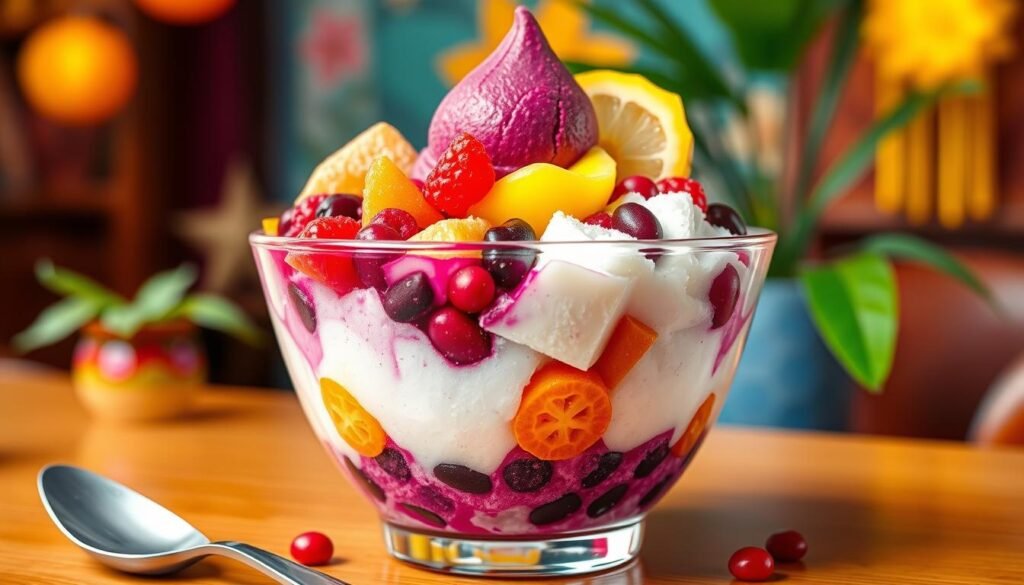Halo-Halo is more than a dessert in the Philippines. It’s a treat that brings people together. This dessert combines sweetened beans, fruits, and creamy milk, topped with ice cream. It’s a key part of Filipino cuisine and culture.
Exploring Halo-Halo reveals a harmony of flavors. From sweet beans and fruits to creamy milk and ice cream, each part adds to the delight. This dessert is deeply rooted in Filipino culture, bringing people together. Whether you love food or want to learn about Filipino culture, this article offers a closer look at Halo-Halo’s unique charm.
Key Takeaways
- Halo-Halo is a popular dessert in the Philippines, known for its unique blend of flavors and cultural significance.
- This layered dessert combines sweetened beans, fruits, and creamy milk, topped with a scoop of ice cream, making it a staple food in Filipino cuisine.
- Halo-Halo is more than just a dessert, it’s an experience that brings people together in the Philippines.
- The history and ingredients of Halo-Halo will be explored in this article, providing a deeper look at this beloved food.
- Understanding the cultural significance of Halo-Halo can provide insight into Filipino culture and the importance of food in bringing people together.
- Halo-Halo is a significant part of the food scene in the Philippines, and its unique flavors and ingredients make it a must-try dessert for anyone interested in Filipino cuisine.
What is Halo-Halo?
Halo-halo is a beloved Filipino dessert that’s both sweet and refreshing. The name “Halo-Halo” means “mix-mix” in Filipino. It’s a layered treat made with crushed ice, milk, and various ingredients like ube jam and coconut strips.
Ingredients in Halo-halo can change, but you’ll often find sugar palm fruit and coconut sport. It’s served in a tall glass with a long spoon. This lets you mix everything for a layered and sweet treat.
Origin of the Dessert
Halo-halo’s roots go back to pre-war Japanese Filipinos and the Japanese kakigōri dessert. One early version was monggo con hielo. It had mung beans in syrup on crushed ice with milk and sugar.
Basic Ingredients
Here are some basic ingredients of halo-halo:
- Sweetened beans
- Fruits like saba plantains and jackfruit
- Coconut milk or evaporated milk
- Crushed ice
- Ube jam and other sweet preserves
Cultural Significance
Halo-halo is seen as the unofficial national dessert of the Philippines. It’s a favorite at social gatherings and celebrations. Its layered and sweet taste has won the hearts of both locals and tourists.
The Layers of Halo-Halo
Halo-Halo is a beloved Filipino dessert known for its layers. Each layer has a special history that adds to the dessert’s cultural value. The mix of sweetened beans, fruits, and creamy milk makes it a refreshing treat.
Sweet Beans and Fruits
The bottom layer of Halo-Halo has sweetened beans and fruits like kidney beans and kaong. These add sweetness and texture. The use of these ingredients comes from the Japanese influence in the Philippines.

Ice and Shaved Ice Variations
The middle layer is shaved ice, which cools the dessert. Shaved ice is a nod to Halo-Halo’s Japanese roots. It adds a refreshing touch, perfect for hot days.
The history of Halo-Halo shows the cultural exchange between the Philippines and other countries. This exchange has shaped Halo-Halo into a unique dessert that highlights the country’s culinary creativity.
Popular Variations of Halo-Halo
Halo-halo, a beloved Filipino dessert, has seen many changes over the years. This food is a favorite in the Philippines, with each twist bringing a new flavor. Prices for these variations range from Php 85 to Php 150, making it a sweet and affordable treat for all.
Aling Taleng’s Halo-halo has been a favorite for over 80 years, serving the same recipe. Ben’s Halo-halo offers a spicy winter version and a salty summer version. Kabigting’s Halo-halo is known for its simple yet delicious recipe, using mashed kidney beans, cream corn, and carabao’s milk pastillas.
In La Union, Halo-halo de Iloko is a unique twist, deep-frying the ingredients in a lumpia wrapper. The Wintermelon Halo-Halo from Pagsanjan, Laguna, has kept its recipe unchanged for 80 years. These variations show the creativity and adaptability of Filipino cuisine, making halo-halo a cherished food in the Philippines.
| Variation | Ingredients | Price |
|---|---|---|
| Aling Taleng’s Halo-halo | Red mung beans, white beans, ube, macapuno, sweetened kundol | Php 100 |
| Ben’s Halo-halo | Spicy winter halo-halo with chili, salty summer halo-halo with salted egg | Php 120 |
| Kabigting’s Halo-halo | Mashed kidney beans, cream corn, carabao’s milk pastillas | Php 90 |
The Art of Assembling Halo-Halo
Making Halo-Halo is an art that needs patience and detail. It’s all about balancing the layers and ingredients. You can use patterns with beans and fruits or mix shaved ice and evaporated milk just right.
A beautifully made layered dessert like Halo-Halo can make a big difference. Adding nuts or whipped cream can make it even better. With so many options, Halo-Halo is a fun and unique dessert to make and enjoy.

- Creating a base layer with sweetened beans and fruits
- Adding a middle layer of shaved ice and evaporated milk
- Toppling with a variety of toppings, such as nuts, whipped cream, or fruit
Try different ways of layering and ingredients to make your Halo-Halo special. It’s a chance to show off your creativity and style.
Halo-Halo in Filipino Culture
Halo-Halo is more than a dessert in the Philippines; it’s a symbol of summer and the country’s rich culture. The name “Halo-Halo” means “mix-mix,” showing the mix of ingredients and flavors. It’s a big part of Filipino traditions and celebrations.
In summer, Halo-Halo is a hit at social events and celebrations. It’s also a must-have at Filipino festivals and fiestas. Toppings like ube halaya, leche flan, and ice cream make it even more special.

Halo-Halo brings people together, creating a sense of community and celebration. It’s deeply rooted in Filipino history and culture. It’s a symbol of the country’s warm hospitality and love for festive gatherings.
A Symbol of Summer
Halo-Halo is a summer treat, symbolizing warmth and vibrancy. The mix of shaved ice, sweet ingredients, and evaporated milk is refreshing. It’s a cool respite from the summer sun.
Celebration and Festivity
Halo-Halo is a favorite at Filipino festivals and fiestas. It’s a colorful and vibrant treat that celebrates special occasions. Its rich flavor and cultural significance make it perfect for festive gatherings.
| Ingredient | Description |
|---|---|
| Shaved Ice | A key component of Halo-Halo, shaved ice helps to cool and refresh the palate. |
| Sweetened Ingredients | Ingredients like white beans, red beans, and colorful jellies add natural sweetness and flavor to the dessert. |
| Evaporated Milk | Evaporated milk is drizzled over the top of the dessert, adding a creamy texture and rich flavor. |
Nutritional Aspects of Halo-Halo
Halo-Halo is a beloved Filipino dessert. It’s made with shaved ice, evaporated milk, and sugar. It’s topped with fruits, nuts, and sweetened beans. Knowing its nutritional value is key, as it’s a sweet treat. Check out the food to make better choices.
A serving of Halo-Halo can have 300 to 500 calories. This depends on the ingredients and how much you eat. To make it healthier, try using low-fat milk or less sugar. Adding fresh fruits and nuts boosts fiber and antioxidants, making it a better food choice.

- Use sweetened condensed milk with at least 8 percent milkfat and 28 percent milk solids.
- Add tapioca, which is safe for eating, as per the FDA.
- Include fresh fruits and nuts for more fiber and antioxidants.
With these changes, you can enjoy a sweet and nutritious Halo-Halo. It’s a great Filipino treat for hot summer days.
Halo-Halo vs. Other Desserts
Halo-halo is a special layered dessert from the Philippines. It’s different from sundaes or parfaits because of its unique mix of ingredients. Sweetened beans and fruits give it a special flavor and texture.
Compared to other desserts, halo-halo is more complex. Korean Bingsu, for example, is a shaved ice dessert with fruit and condensed milk. But halo-halo has crushed ice and evaporated milk with optional sugar for sweetness.
Comparison with Similar Desserts
- Halo-halo uses crushed ice, while Bingsu features shaved ice that is soft and melts quickly.
- Halo-halo incorporates evaporated milk, whereas Bingsu uses condensed milk for a naturally sweet taste.
- Halo-halo is customizable with a mix of various ingredients, allowing for the removal of specific components if desired.

Unique Elements of Halo-Halo
Halo-halo stands out because of its unique mix. Sweetened beans, fruits, and evaporated milk make it creamy and refreshing. The crushed ice and customizable nature also make it a hit with Filipinos and visitors.
How to Make Halo-Halo at Home
To make Halo-Halo at home, you need to prepare the ingredients. These are key to the food culture in the Philippines. The history of Halo-Halo is rich and diverse, with many ingredients and ways to prepare.
The main ingredients for Halo-Halo include shaved ice, evaporated milk, and sugar or syrup. You also need sweet beans, sweet banana, nata de coco, and garbanzos. Jelly, macapuno, sago, gulaman, sweet jackfruit, ube halaya, and leche flan are also important. You can find these at most Asian markets or online.
Here’s a step-by-step guide to making Halo-Halo at home:
- Prepare the sweetened beans and fruits by boiling and sweetening them in water.
- Assemble the dessert by layering the ingredients in a glass or bowl. Start with the sweetened beans and fruits, then add the shaved ice. Finish with the evaporated milk and cream.
- Use essential tools and equipment, such as a blender or ice shaver, to create a smooth and creamy texture.

With these simple steps, you can make a delicious Filipino dessert at home. Enjoy the rich history and cultural significance of Halo-Halo as a beloved food in the Philippines.
Best Places to Find Halo-Halo in the Philippines
Looking for the best Halo-Halo in the Philippines? You have many options. This sweet Filipino treat is loved by many. It’s a big hit in the country’s food world.
Manila, Cebu, and Davao are great places to try Halo-Halo. You’ll find many vendors and restaurants here. For a real taste, check out street vendors. They serve it in colorful carts or stalls.
Top-Rated Restaurants
Some top spots for Halo-Halo include Milkyway Cafe, Aristocrat restaurant, and Little Quiapo. These places have been around for years. They’re known for their traditional dishes and Halo-Halo.
Here are some top spots for Halo-Halo in the Philippines:
- Milkyway Cafe
- Aristocrat restaurant
- Little Quiapo
- Razon’s

Street Vendors vs. Cafés
Street vendors give you a unique Halo-Halo experience. But, cafés and restaurants offer a modern twist. Chains like Manam, Chowking, and Mang Inasal have many branches. They make Halo-Halo easy to find for everyone.
| Restaurant | Number of Ingredients |
|---|---|
| Razon’s of Guagua | 3 |
| Milky Way Café | 7 |
| Kabigting’s | 3 |
| The Aristocrat Restaurant | Multiple |
The Economics of Halo-Halo
Halo-halo’s economics is quite interesting. It affects both those who buy it and the local shops that sell it. A study found that halo-halo can boost sales by 15% to 25% for some businesses.
The price of halo-halo varies a lot. It can cost between ₱50 to ₱200, depending on where you buy it. For more info, check out this article on philstar.com. It gives great insights into the food world.
Here are some key facts about halo-halo’s economics:
- The halo effect can increase total sales by 5% and more than double net profits.
- By optimizing the product mix and doubling incremental halo sales with promoted products, it can drive a 5% or greater impact on total store sales.
- Effective use of the halo effect can empower grocery retailers to take a cross-category, total store approach to promotional product mix optimization and pricing, impacting the net P&L.

In conclusion, halo-halo’s economics is complex. It impacts both buyers and local shops. Understanding its pricing, demand, and economic effects helps us see its importance in the dessert world.
| Location | Average Price of Halo-Halo |
|---|---|
| Street Vendors | ₱50-₱100 |
| Restaurants | ₱100-₱200 |
| Cafes | ₱150-₱250 |
The Global Influence of Halo-Halo
Halo-halo, a beloved Filipino dessert, has become famous worldwide. Its mix of food and history is unique. Filipinos living abroad have shared it with places like the United States, Japan, and the United Arab Emirates.
Historical records show halo-halo has changed a lot. It now includes local ingredients like ube and cassava. These add to its flavor and texture.
Now, halo-halo is enjoyed in many ways around the globe. In the United States, it’s often made with pineapple and coconut. In Japan, you can find a matcha version. Each place puts its own spin on this traditional treat.

The Philippines’ past has shaped its desserts, including halo-halo. Being under Spanish rule for nearly 400 years has left a mark. This European influence is clear in many Filipino sweets.
| Country | Halo-Halo Variation |
|---|---|
| United States | Hawaiian-style with pineapple and coconut |
| Japan | Matcha-flavored |
| Philippines | Traditional with ube, cassava, and other local ingredients |
Celebrating Halo-Halo Day
Halo-Halo Day is a time to celebrate the Filipino dessert we all love. It’s filled with events, festivals, and community activities. People gather to enjoy sweet treats and learn about Halo-Halo’s history and cultural importance.
The National Halo-Halo Sarap Day is a big event every March. Mang Inasal offers a special deal on their Pinoy Halo-Halo. This makes it easy for everyone to try this food delight. With over 600 stores across the country, Mang Inasal plays a big role in celebrating Halo-Halo Day.
Events and festivals around Halo-Halo Day include:
- Cooking competitions
- Dessert-making workshops
- Cultural performances

Halo-Halo Day is more than just a dessert celebration. It brings people together, creating a sense of community and social bonding. It’s a time to enjoy sweet treats and learn about Halo-Halo’s rich history and cultural significance.
| Event | Date | Location |
|---|---|---|
| National Halo-Halo Sarap Day | March 15 | Nationwide |
| Halo-Halo Festival | September 28, 2024 | Auckland Showgrounds, Greenlane |
Halo-Halo in Media
Halo-Halo, a beloved layered dessert in the Philippines, has caught the eye of many. Its mix of ingredients and beautiful look has impressed filmmakers, TV producers, and social media fans. People love to share their Halo-Halo on social media, using #HaloHalo to connect with others.
Halo-Halo has also appeared in Filipino movies and TV shows. It’s seen as a symbol of Filipino culture and tradition. As Halo-Halo’s popularity grows, we’ll likely see it more in media.

Social Media Trends
Halo-Halo is a hit on social media, with many sharing their own versions. Some trends include:
- Unique ingredient combinations, like adding fruits or nuts
- Stunning presentations, like layering in a glass
- Creative twists, like adding ice cream or honey
Halo-Halo’s media presence shows its lasting appeal and versatility. It’s a favorite in films, TV, and on social media. Its unique ingredients and beautiful look will keep delighting people.
Environmental Impact of Halo-Halo Ingredients
The way halo-halo ingredients are made and sourced affects the environment a lot. It’s key to see how the food industry impacts our planet. Knowing the history of halo-halo helps us find ways to make it better for the Earth.
To lessen halo-halo’s environmental footprint, we can choose sustainable ingredients. This means picking fruits and beans from local farms. We can also cut down on waste while making it by using eco-friendly containers and reducing leftovers.
Here are some tips for making halo-halo with less waste:
- Use reusable containers and utensils
- Choose ingredients with minimal packaging
- Plan ahead to avoid food waste
By choosing sustainable options, both vendors and those who enjoy halo-halo can help the planet. 
| Ingredient | Environmental Impact | Sustainable Alternative |
|---|---|---|
| Fruits | Water pollution, soil degradation | Locally sourced, organic fruits |
| Beans | Water pollution, energy consumption | Sustainably sourced, low-water beans |
Future of Halo-Halo
As the beloved Filipino dessert continues to win hearts, its future looks bright. It will see new ingredients like matcha or ube and modern cooking methods. Yet, keeping its cultural roots and authenticity is key.
Halo-Halo can grow by mixing old and new. This way, it will stay a beloved part of Filipino food culture. As it reaches more places, it will inspire new fans to enjoy its layers. The future of Halo-Halo is a mix of tradition and innovation, promising to delight many for years.
FAQ
What is Halo-Halo?
Halo-Halo is a beloved Filipino dessert. It’s called “mix-mix” in Filipino. It’s made of sweetened beans, fruits, and creamy milk, topped with ice cream.
What are the basic ingredients of Halo-Halo?
Halo-Halo’s basic ingredients are sweetened beans, fruits, and creamy milk.
What is the cultural significance of Halo-Halo in the Philippines?
Halo-Halo is important in the Philippines. It’s served at gatherings and celebrations. It brings people together.
What are the different layers of Halo-Halo?
Halo-Halo has layers of sweetened beans and fruits, shaved ice, and evaporated milk and cream.
What are some popular variations of Halo-Halo?
Halo-Halo has many variations. Different regions use special ingredients and modern twists.
How is Halo-Halo assembled?
Assembling Halo-Halo is an art. It requires patience and detail. There are many ways to layer and garnish it.
How is Halo-Halo celebrated in Filipino culture?
Halo-Halo is a summer symbol in the Philippines. It’s enjoyed at gatherings and festivals. It’s loved by all ages.
How healthy is Halo-Halo?
Halo-Halo is high in calories and sugar. But, you can make it healthier. Use low-fat milk and add fresh fruits and nuts.
How does Halo-Halo compare to other desserts?
Halo-Halo is unique. It uses sweetened beans and fruits. It’s different from sundaes or parfaits.
How can you make Halo-Halo at home?
Making Halo-Halo at home is easy. Prepare the beans and fruits. Assemble the layers in a glass. Use tools like blenders or ice shavers.
Where can you find the best Halo-Halo in the Philippines?
Find authentic Halo-Halo in top restaurants, street vendors, and cafés. Try it in Manila, Cebu, and Davao.
How does the economics of Halo-Halo work?
Halo-Halo’s price varies. Street vendors are cheaper, while high-end restaurants are pricier. Its popularity boosts local businesses.
How has Halo-Halo gained global popularity?
Halo-Halo is loved worldwide. The Filipino diaspora and interest in international cuisine have helped. It’s adapted in many places.
How is Halo-Halo Day celebrated?
Halo-Halo Day celebrates this Filipino dessert. It’s marked with events and festivals. It promotes community and bonding.
How has Halo-Halo been represented in media?
Halo-Halo has appeared in film, TV, and social media. It shows its popularity and influence.
What is the environmental impact of Halo-Halo ingredients?
Halo-Halo’s ingredients affect the environment. Using sustainable ingredients and reducing waste is key to its environmental impact.
What is the future of Halo-Halo?
Halo-Halo’s future is bright. It will evolve with tastes and trends. It will keep its traditional roots and cultural significance.
Source Links
- Halo Weft Hair Extensions – 100g – https://highendhairsupplies.com.au/products/halo-weft-hair-extensions
- Masterpiece poems on Hello Poetry – https://hellopoetry.com/words/masterpiece/
- Types of Prose Narratives: A Text-Book for the Story Writer – https://www.gutenberg.org/ebooks/64210.html.images
- Halo-halo – https://en.wikipedia.org/wiki/Halo-halo
- How to Make Halo-Halo (Filipino Shaved Ice Dessert) – https://www.seriouseats.com/halo-halo-5195652
- Filipino "Halo-Halo" Is the Most Delicious Way to Beat the Heat – https://www.thekitchn.com/halo-halo-recipe-23185201
- Halo-Halo Dessert – https://www.thespruceeats.com/halo-halo-5409582
- Halo-Halo Recipe – Foxy Folksy – https://www.foxyfolksy.com/halo-halo-recipe/
- 7 Unique HALO-HALO Versions around the Philippines – https://www.thepoortraveler.net/2020/04/philippines-halo-halo/
- 6 Trending Halo-Halo Versions to Recreate at Home – https://www.recipedia.com/en-ph/articles/food-trends/food-lifestyle/trendy-halo-halo/
- Discover A Twist To The Classic Halo-Halo With Legazy® – https://www.wearlegazy.com/blogs/blogs/discover-a-twist-to-the-classic-halo-halo-with-legazy?srsltid=AfmBOoosK2hlY7Gm60N_quvTVSDI_cagHyq7gMu0Ef-1gDWTeVw7tFao
- What is Halo-Halo? – https://www.snowicesupply.com/what-is-halo-halo/
- How to make the Filipino dessert halo-halo like a world-class pastry chef – https://www.latimes.com/food/dailydish/la-fo-halo-halo-20170928-story.html
- Halo-halo Around the Philippines – https://www.gridmagazine.ph/story/halo-halo
- Beating the heat and more: How well do you know your halo-halo? – https://www.sbs.com.au/language/filipino/en/article/beating-the-heat-and-more-how-well-do-you-know-your-halo-halo/vmebloj2s
- Desserts and Dialects: The Diverse Halo-Halo of Philippine Languages – https://xillium.ph/desserts-and-dialects/
- Halo-Halo: Favourite Dessert Of The Philippines – https://theculturetrip.com/asia/philippines/articles/the-curious-history-of-halo-halo-the-philippines-favourite-dessert
- Hello Halo-Halo! – https://www.caremin.com/2018/08/hello-halo-halo/
- Halo-halo | Food | Eat Dat – https://www.eatdat.com/food/halo-halo/
- BINGSU VS HALO-HALO – https://compareeat.wordpress.com/2018/10/02/bingsu-vs-halo-halo/
- Mixing it up in the Philippines: the story of halo-halo – https://ese-ne-tekrema.community/2020/02/23/mixing-it-up-in-the-philippines-the-story-of-halo-halo/
- Halo-Halo Recipe (How to Make Halo-Halo) – https://pilipinasrecipes.com/halo-halo-recipe/
- Halo-Halo (Filipino Shaved Ice Dessert) | Iankewks – https://iankewks.com/halo-halo-filipino-shaved-ice-dessert/
- The Best Halo-Halo Spots in Metro Manila | Booky – https://booky.ph/blog/halo-halo/
- Where to Try The Best Halo-Halo in Manila – KKday Blog – https://www.kkday.com/en/blog/36188/philippines-where-to-try-the-best-halo-halo-in-manila?srsltid=AfmBOooUSXnHcmBqmYQvmQZsZYpi7U33dcrlqmWTbB_TjCSoo4FJagwQ
- Trying Halo-Halo in Metro Manila — BOSFilipinos – https://www.bosfilipinos.com/blog/2018/8/15/trying-halo-halo-in-metro-manila
- PDF – https://www.daisyintelligence.com/wp-content/uploads/Daisy-Intelligence-Halo-Economics-and-the-Impact-on-Grocery-Decision-Making.pdf
- La Union: Halo-Halo de Iloko Balay | Department of Trade and Industry Philippines – https://www.dti.gov.ph/zero-to-hero/zth_luzon/zth_region-1/la-union-halo-halo-de-iloko-balay/
- Halo-Halo, The Ultimate Filipino Dessert, Gains In Popularity – https://www.cbsnews.com/losangeles/news/halo-halo-the-ultimate-filipino-dessert-gains-in-popularity/
- Purple Yam and Halo-Halo: The Delicious, Contradictory World of Filipino Desserts – https://www.seriouseats.com/filipino-sweets-dessert-introduction
- Japanese origins of the Philippine ‘halo-halo’ – https://opinion.inquirer.net/35790/japanese-origins-of-the-philippine-halo-halo
- Mang Inasal puts spotlight on ‘Mas Ma-Crema Pinoy Halo-Halo’ in a one-day nationwide celebration – https://business.inquirer.net/291736/mang-inasal-puts-spotlight-on-mas-ma-crema-pinoy-halo-halo-in-a-one-day-nationwide-celebration
- Say Hello to the ‘Halo Halo Festival’ – Filipino News | The Voice of Filipinos in New Zealand – https://www.filipinonews.nz/featured/say-hello-to-the-halo-halo-festival/
- Happy Halodays 2021 – https://www.halowaypoint.com/news/happy-halodays-2021
- Home – Halo Halo Multimedia – https://halohalomultimedia.com/
- Halo Halo – A unique Filipino dessert (topped with ice cream and CORN!) – https://tastesseoulgood.wordpress.com/2019/07/27/halo-halo-a-unique-filipino-dessert-topped-with-ice-cream-and-corn/
- Classic Halo-Halo With A Twist At Ben’s Halo-Halo – – https://www.teybolforwan.com/food-guide/food-reviews/classic-halo-halo-with-a-twist-at-bens-halo-halo/
- Call for Papers: Halo-Halo Ecologies – https://philippinestudiesgroup.wordpress.com/2021/08/12/call-for-papers-halo-halo-ecologies/
- Does Eco-Score create a halo effect? – https://www.foodnavigator.com/Article/2024/07/04/Eco-Score-may-lead-to-halo-effect-Study/
- Environmental Effects on Galaxy Clustering – https://iopscience.iop.org/article/10.1086/591071/fulltext/73833.text.html
- ‘Halo-halo’ moments – Inquirer Young Blood – https://inqyoungblood.com.ph/2024/07/15/halo-halo-moments/
- ‘Halo-halo’ moments – https://opinion.inquirer.net/175160/halo-halo-moments
- Halo Halo Metaverse – https://halohalostore.ph/pages/halohalo-world

